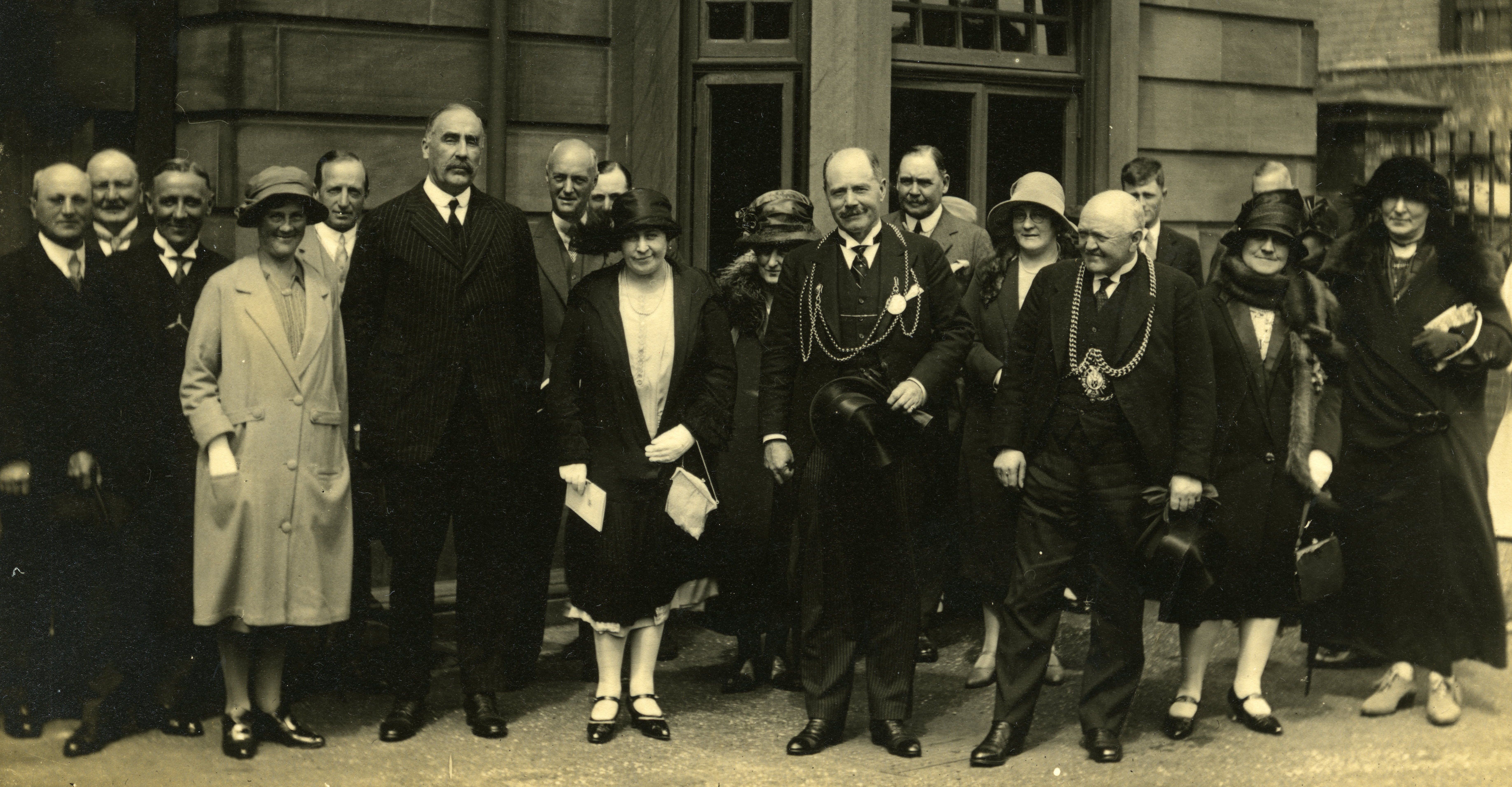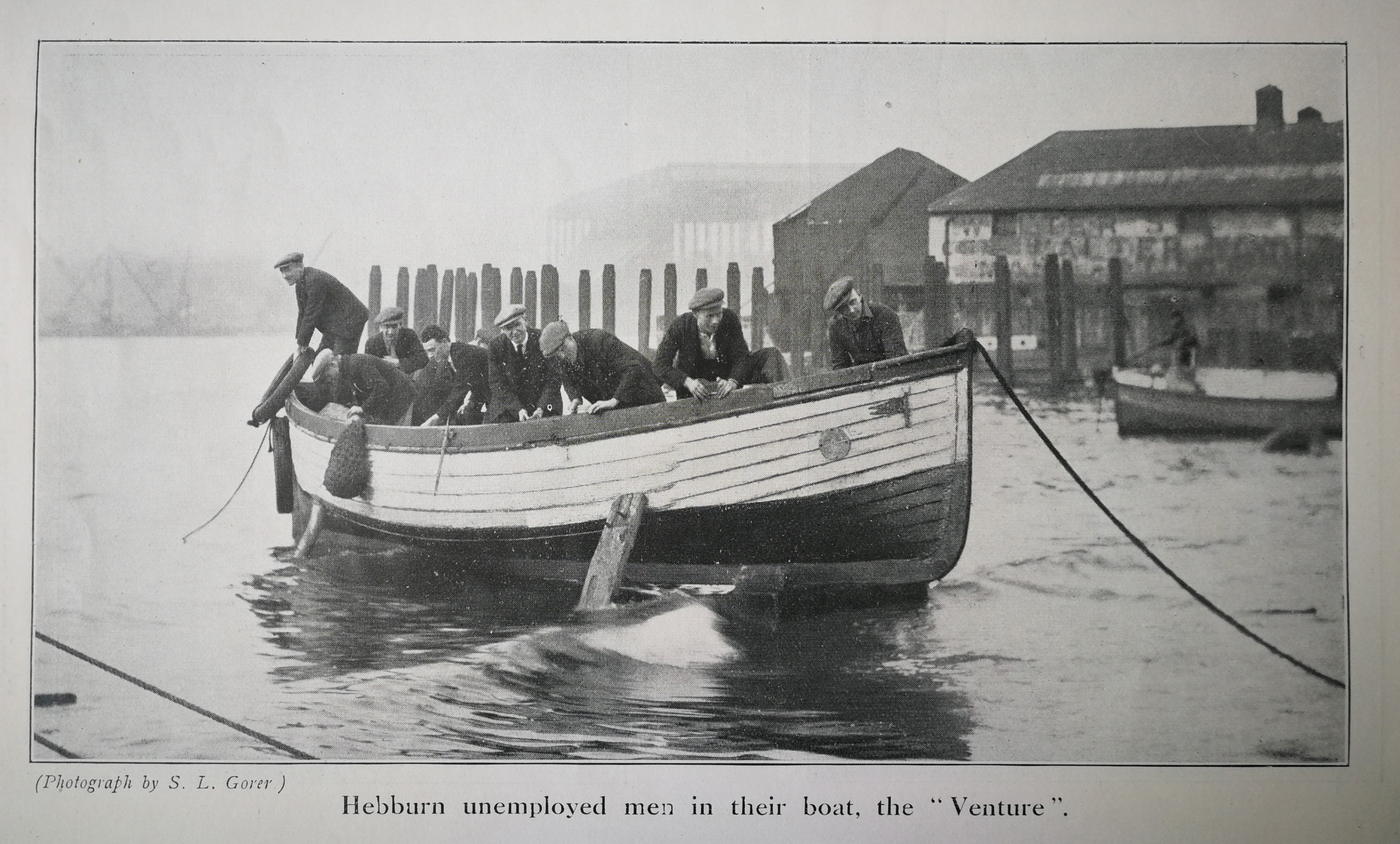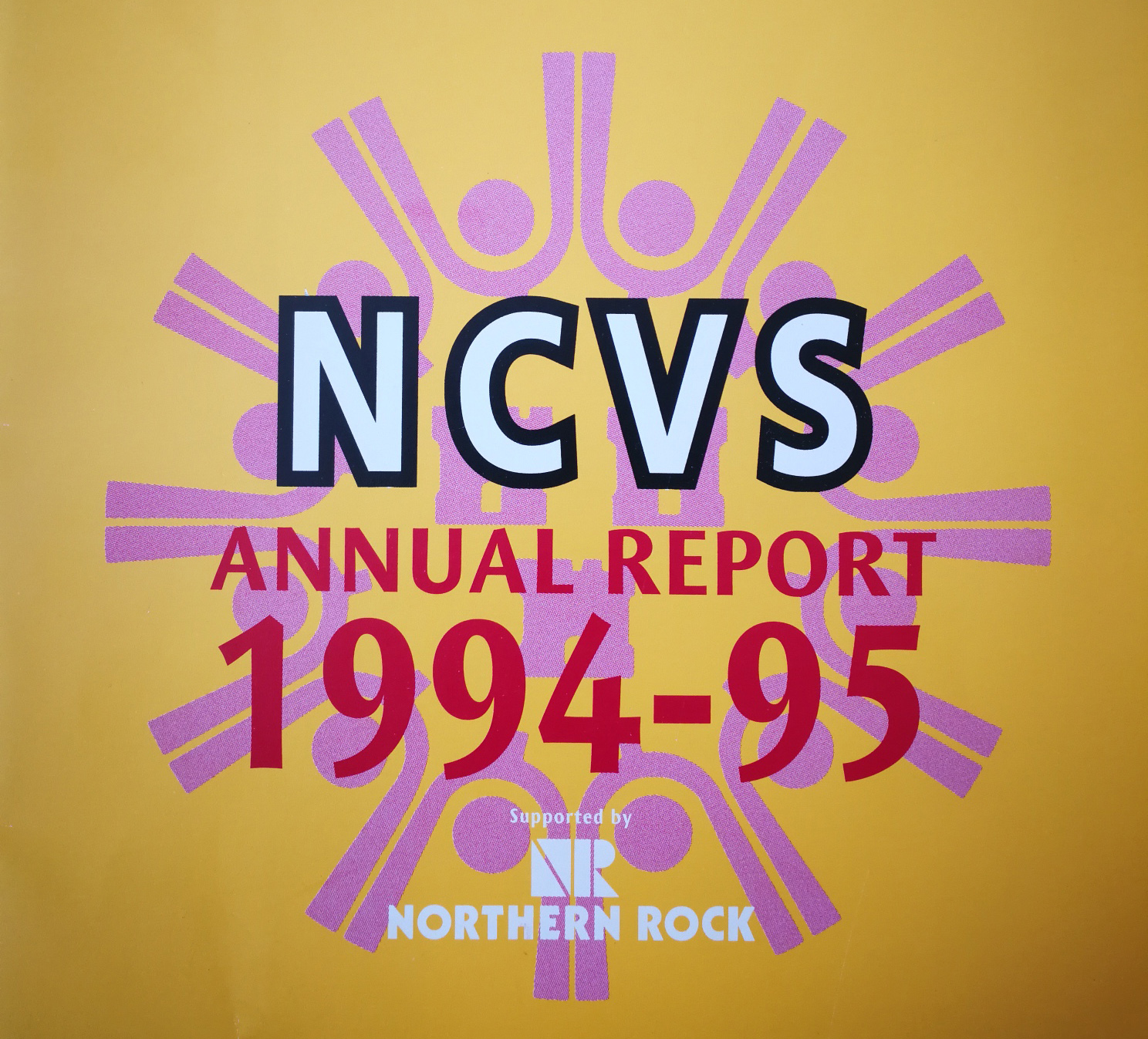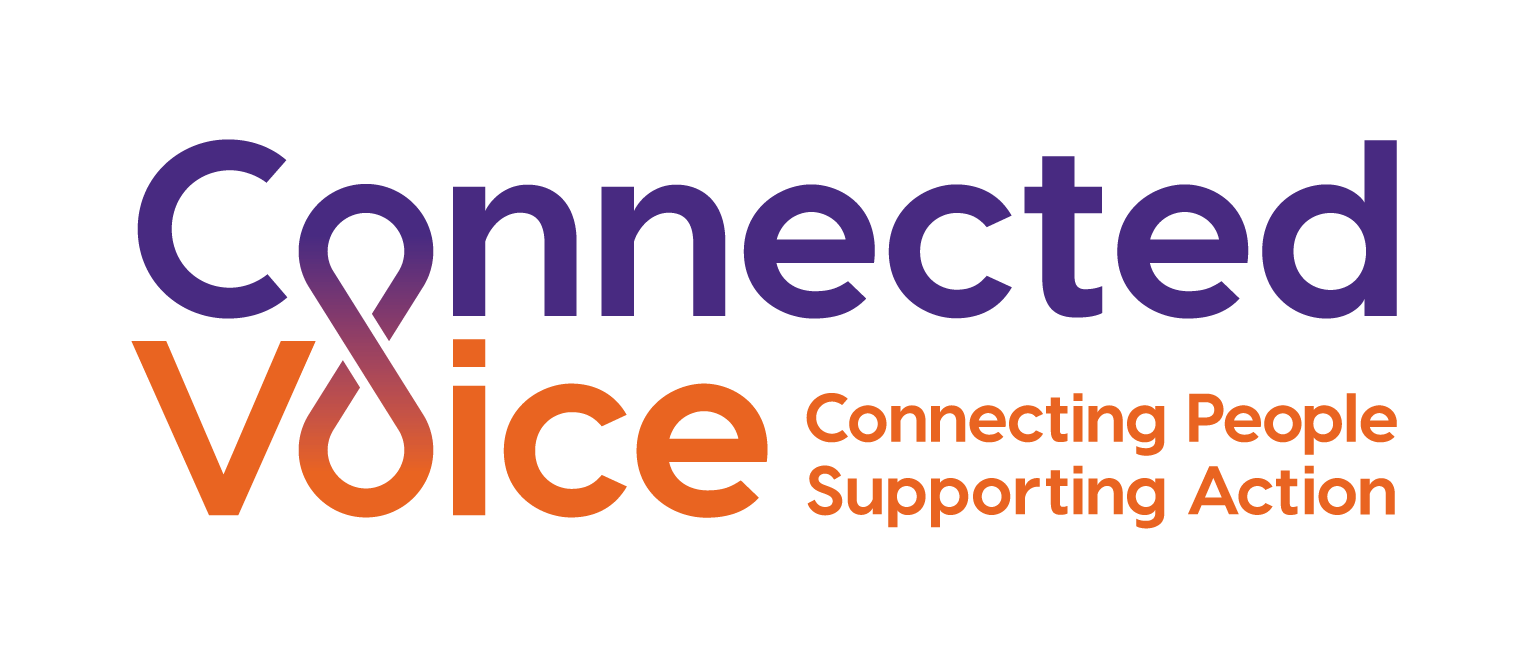Our Story
Our organisation has been supporting charities and communities in Tyneside since 1929. In our 90-year history we have helped to establish well-known charities that are still thriving today, and paved the way for many national services, including pro-bono services from volunteer lawyers in Gateshead following Poor Man’s Lawyer movement, (a predecessor to Legal Aid). We are proud of the positive impact we have made and strive to continue offering the highest standard of services we can to the voluntary sector and communities of Newcastle and Gateshead.
In this short video, local poet Rowan McCabe shares a piece he wrote about the beginnings of Connected Voice, our founding member Teresa Merz, and the importance of local community action:
Identifying the need in 1925: ‘It is not a pleasant picture’
In 1924, a conference in Newcastle on Christian Politics, Economics and Citizenship, inspired a small group of people to form a society to promote ‘a healthy and well informed opinion on social questions’ in Tyneside. This established ‘The Bureau of Social Research for Tyneside’ in 1925. The ‘Tyneside’ region studied included Newburn, Newcastle, Wallsend, Gosforth, Whitley Bay and Tynemouth on the north side of the river and Blaydon, Wickham, Gateshead, Felling, Hebburn, Jarrow and South Shields on the south side. Over the next few years, this group of people carried out research to produce a comprehensive social survey of the region. The shocking information highlighted within the research led to the establishment of ‘a council of social service for a wide area embracing rich towns and poor towns’. This was part of a national movement of ‘Councils of Social Service’. One of our founding members was Teresa Merz. You can read about 'one of the most remarkable women in the North East' in our short blog.
Photo: Teresa Merz, pictured left, was one of our founding members. Photo courtesy of Simon Pringle.

The following is an excerpt from the report, which paints a stark picture of what life was like:
“It is not a pleasant picture which has been drawn, but it is a true picture… It is probable that the Tyneside population is the worst housed population in England and Wales. The health of the area is at least as bad as that of any other district, and the amount of tuberculosis is appalling. In the matter of elementary education the area is backward; in most of the towns the schools are poorly staffed.
The overcrowding figures bring to mind homes so tiny and so crammed that they almost seem to protrude bedsteads as one passes along the street. The density per acre figures are the summary of row after row of front doors level with the pavement, whilst in the rear a little bricked-in yard opens on a back lane. The health figures speak tragically to anyone who has sensibilities; they tell of house after house where there is some tuberculosis member of the family, a child with swollen glands, a big boy at the children’s hospital, a father at the sanatorium, or a daughter dying slowly in one of the two rooms which constitute a home. That violently fluctuating curve of unemployment corresponds to the many hundreds of housewives trying to meet the needs of their households, with no assurance as to what money will be forthcoming on the morrow, or whether there will be any money at all… Men who are eating their hearts out, who are losing their morale, who have been reduced from the status of self-supporting men to that of paupers.”
Industrial Tyneside: A Social Survey made for the Bureau of Social Research for Tyneside by Henry A. Mess, first published in 1928.
In 1929, our organisation, then called ‘Tyneside Council of Social Service’, formed to respond to the need for a social service. It covered the areas we now recognise as Newcastle, Gateshead, North Tyneside and South Tyneside.
The most urgent task then was to fight the misery of mass unemployment. This involved education, building clubs, (self) building better homes and promoting welfare services . The ‘Poor Man’s Lawyer’, the forerunner to Legal Aid, was started in Gateshead when local solicitors agreed to give free legal advice. The Tyneside Council of Social Service set up many new organisations to respond to the growing needs. More than 30 Tyneside occupation centres aimed at keeping the unemployed fit were started as the Depression took its toll. Cobbling and carpentry lessons were offered at nearly all the clubs, and allotments, poultry and bee-keeping projects were also started.
During the war years, 20 ‘help and information centres’ were set up which aided 2,000 people facing personal difficulty. A network of ‘friendly visitors’ to older people and ‘Over 60s’ clubs were launched. Our organisation also set up 18 Citizen’s Advice Bureaus following recommendation from the National Council of Social Services (now National Council of Voluntary Organisations) to roll out the first 200 bureaux in 1939 throughout the country.
Photo: When our organisation was first set up in 1929, we provided boats for unemployed men in Hebburn so they could fish. Hebburn was also the place where we helped to set up Britain's first community centre

The post war years
After the war, our personal welfare work developed further to meet the new social needs, including the development of 34 women’s clubs, 52 over-60s clubs and more than a hundred ‘old people welfare committees’. These eventually formed part of Age UK. In the 1950s, there was a greater focus on family care, until local authorities began to recognise the need and assumed responsibility. Pioneer work by our organisation continued, as we set up the first Family Care Committee in Northumberland and provided intensive rehabilitation work with families. In 1959, the Rendezvous club for lonely people attracted more than 70 people at its first meeting in South Shields.
Our work in the 1960s mirrored the changing society; a 1964 conference titled ‘Where can I go for the night?’ highlighted the urgent need for emergency accommodation for women and inspired The Salvation Army to open a women’s hostel at North Ashfield in Newcastle. There was a new focus on homelessness services, children’s play and setting up pre-school playgroups, as many families moved into newly built council flats and high-rise blocks. This carried on through the 1970s, with more community-based groups including the Byker Project, which soon found itself supporting 47 different groups and answering up to 400 enquiries a week. Other projects included the launch of the Newcastle Council for Disabled People (which later became Disability North), and the Volunteer Bureau.
In 1974, our organisation became ‘Newcastle Council for Voluntary Service’ (Newcastle CVS). With the change in name came an increased emphasis on providing advice and development support to voluntary and community organisations in Newcastle.
The next 30 years saw us involved more with projects promoting equality and diversity. The Inner City Forum was set up to bring together, support and provide a voice for community groups involved in regeneration and environmental schemes.
Photo: The Byker Wall, photo from 'Speaking for myself... A report on the Byker redevelopment made for Newcastle Council for Voluntary Service' April 1978

Recent history
In 1993, we established a trading company called Ellison Services (now called Connected Voice Business Services): combining our extensive knowledge of finance and running voluntary sector organisations to provide specialist and affordable finance services, whilst gifting all profits back to Connected Voice to further our charitable work. Connected Voice Business Services has been successfully supporting the charitable sector with accounting services for over 30 years.
Over the last 15-20 years, we have seen a greater emphasis on partnership working and supporting voluntary organisations to engage in statutory agencies and processes by regularly facilitating networking events, and representing and promoting the value of the voluntary sector on partnership boards. In the early noughties, we worked with Newcastle City Council to create the city’s first Compact, which recognised that an independent, diverse and thriving voluntary and community sector was vital to the wellbeing of society and the prosperity of Newcastle. It set out shared principles and commitments to make working together more effective. More recently, its reach was extended when Newcastle Gateshead CCG, Newcastle Hospital Trust, Northumberland, Tyne and Wear NHS Foundation Trust, North East Ambulance Service, Brunswick Parish Council and Northumbria Police and Crime Commissioner all signed up to the Compact.
Photo: Cover of an annual report that illustrates how our brand has evolved over the years. Many 'CVS's' like ours used to share a similar logo

During this time we also placed greater importance on supporting organisations representing minoritised communities. In 2000, we worked with Pride on Tyne which was set up to run a range of community-based cultural activities, including an annual Pride festival for LGBT+ communities. We supported them with their governance and developing a constitution which was adopted in 2001. You can learn more about the local history of Pride in a recent blog. Our services still actively support LGBT+ organisations today, and our Advocacy Service has also evolved to offer specialist support to LGBT+ people.
Our support for individuals began with setting up Newcastle Advocacy Centre in 1996, which later became known as Advocacy Centre North and now Connected Voice Advocacy to reflect our wider geographical reach. Our Advocacy project was initially formed to facilitate a network of people and organisations with an interest or involvement in advocacy, and to provide a Citizen Advocacy scheme to vulnerable people with disabilities in Newcastle.
Once again, we lead by example, creating ‘ANNETTE’, an advocacy monitoring tool that was sold throughout the UK. In 2005, we gave evidence to the Joint Committee on Mental Health Bill in Parliament about Mental Health Advocacy, which was a crucial step in allowing patients to receive advocacy support from an Independent Mental Health Advocate (IMHA).
From 2009, our services expanded to provide statutory advocacy services for people who have a legal right to an advocate. This includes Independent Mental Health Advocacy (following the changes to the Mental Health Bill in 2005), Independent Mental Capacity Advocacy (IMCA), Deprivation of Liberty Safeguards (DoLS) Relevant Person’s Representative (RPR) and Independent Care Act Advocacy (ICAA).
Our non-statutory advocacy services also expanded to support people with complex needs and chaotic lives (as part of Fulfilling Lives), people in contact with the Criminal Justice System, people who frequently, or do not, attend GP surgeries and A&E departments, and families in crisis. We were the first organisation in the UK to offer specialist support for people with neurological conditions and specific health and social support for people from Black Asian and Minority Ethnic communities. In 2017, we set up our Welfare Advocacy support following the release of the I, Daniel Blake film. In the same year, we were awarded funding from the Northumbria Police and Crime Commissioner to offer specialist support for anyone affected by hate crime - a service that still continues today.
In our Advocacy service's 25th anniversary year in 2021, we produced a timeline which highlights key achievements and changes to external legislation and support.
Health and social care has always been a significant area of interest for the voluntary sector and in the past ten years or so, we have held contracts to run Newcastle LINK and its successor Healthwatch Newcastle, which became a separate organisation in 2016. In 2017, we welcomed HAREF (now called Connected Voice Haref) into the family to focus on improving access to healthcare in ethnically minoritised communities.
Connected Voice has often acted as a midwife, seeing a need, carrying out research, incubating and developing a project, and then letting it go on to flourish independently. For example, Newcastle Carers, the Volunteer Centre in Newcastle and the Blue Stone Consortium. Our organisation provides a safe haven, experience and support for new organisations.
Looking to the future
Growing in a digital world
‘On the Hoof’ is our health and social care bulletin that was first produced as a printed and posted news bulletin almost 23 years ago. A few years later, we suggested a switch to email, which was met with initial caution and nervousness. Today we send three regular email bulletins (Connected Voice News, Haref Bulletin and On the Hoof) and share most of our communications online through our website and social media. Video is becoming an increasingly popular communication tool and we have produced several films about our advocacy services – Hate Relationships: New Understandings of Hate Crime, It’s a Win-win, Voices of Advocacy, and Fighting for your Rights – which give an insight from the perspectives of service users, advocates and referrers. We continue to invest in digital technologies and pioneer new ideas like our DIY Advocate app, whilst offering advice to other organisations about how to make the most of digital tools. OurGateshead is the community website that we develop and we are excited about the new features and an app that we are hoping to roll out in the near future.
Developing new services
In 2016, we were invited to extend our infrastructure support services to voluntary and community organisations in Gateshead. In 2018, we secured contracts with Newcastle and Gateshead councils to continue serving voluntary, community and social enterprise groups across both local authority areas. Annual surveys of our membership and partners, regular feedback and reviews have shown that our 730 plus members value our services and consistent record of accomplishment.
We continue to support individuals through Advocacy, responding where there is a need. Our contract to provide statutory services has been extended and in 2018, we were selected by Newcastle Gateshead Clinical Commissioning Group to expand our existing community advocacy services across Newcastle and Gateshead from January 2019 to March 2022. At the end of 2018, our hard work and positive results were recognised when we were awarded Outstanding Advocacy Service at the national Advocacy Awards.
The examples we have highlighted are just a selection of the numerous projects and organisations we have helped to establish and support over the years.
Where next?
At a time of political, social and economic uncertainty, we continue to offer professional advice and support to individuals and organisations, and to promote the values and expertise of the voluntary and community sector. The squeeze on the public sector and the growth in austerity and inequalities means there is a need for more social action, not less. We see communities coming together to do good, regardless of whether the state thinks it necessary or not. What goes around comes around!










